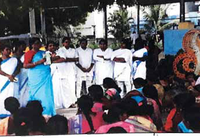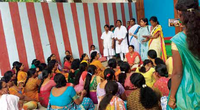Rapid Reporting System for PC & PNDT Act
Rapid Reporting System for PC & PNDT Act
Summary

Innovation :To effectively monitor the enforcement of the PC & PNDT Act
Duration : 20 visits a month
Location : Hyderabad District, Telangana
key stakeholders :Pregnant Women, Primary Health Care Centres, Urban Primary Health Centres, Doctors, Police, Judiciary.
Brief Description

Responding to the alarming situation in which the dignity and rights of the Girl Child are being violated even before her birth, women activists of Hyderabad District protested and the Pre Conception & Pre Natal Diagnostics Act (PCPNDT Act) came into force in the District in 2001. Enacted by the Parliament of India in 1996, the underlying objective of the Act is to prohibit the misuse of prenatal diagnostic techniques and promote their use for medical purposes only.
To discourage and deter the misuse of prenatal diagnostic facilities, several steps have been taken in the District that include the prohibition of advertisements on techniques for sex determination, permission to use such techniques only for specific purposes like detecting genetic abnormalities and only in registered institutions.
Factors Contributing to Success
Online registration and geo-tagging of scanning centres in the District have been the biggest factors behind the success of this initiative. In addition, the conduct of decoy operations and identification of illegal scanning centres have also strengthened the effectiveness of the Act in the District.
Outcome, Benefits & Impact
The adoption of the PC&PNDT Act by the Hyderabad District has helped in reducing the number of incidences of illegal sex determination by closely monitoring scan centres with prenatal diagnostic techniques. A total of 1147 registrations have been issued till date that have covered genetic counselling centres, genetic laboratories, genetic clinics, ultra - sound clinics, imaging centres and other bodies like IVF centres, infertility cure centres and fertility centres.
Further, the use of posters, modules and a short film in the local language to raise awareness on the issue of pre-natal sex determination has not only sensitized the society, but also helped in the promotion of early pregnancy registration, institutional deliveries and birth registration.
Challenges and Future Prospects
The two main challenges faced by the State in implementing this Act include (a) the difficulty of monitoring cases of illegal scanning to determine the sex of the foetus and (b) the larger societal issue of changing mindsets of the people.
However, online registration, geo-tagging and vigilant monitoring of scanning centres coupled with the fast tracking of registration facilities in Urban Primary Health Centers (for instance, online Form-F) and continuous advocacy efforts to generate awareness in society will help in the future.
শেহতীয়া উন্নীতকৰণ: : 2/13/2020
This topic provides information about Awareness on...
This topic covers about Bal Mitra Police.
This topic provides information about Adolescent G...
This topic covers information about ‘No’ to Child ...
